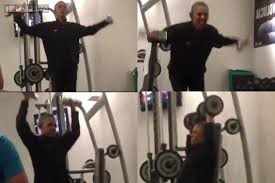What is EPOC?

Don’t Need A Trainer?…
November 6, 2014
HOLIDAY EXCUSES
November 6, 2014
By Paul Dexter, Copyright 2014
Excess post-exercise oxygen consumption (EPOC, informally called afterburn).
Burn calories and torch fat all day long, even when you aren’t working out! When a person works out at an intensity that they can’t sustain for a long period of time, two things happen: their muscles begin to burn and they start feeling out of breath. Why? Upon exertion, muscles start to fill up with lactic acid and the body’s oxygen stores become depleted.
These intense workouts force the body to work harder to build its oxygen stores back up – for a period of 16-24 hours post-workout. The result: more calories burned than if you’d exercised at a lower intensity for the same (or longer) period of time. A great analogy is maxing out your credit card: During rest, your body has to work hard to clear away the lactic acid and pay back its oxygen debt. Exactly how much you burn after exercising is directly correlated to the duration and intensity of your workout.
The body will then restore itself to its pre-exercise state, by consuming oxygen at an elevated rate, and thus causing the body to expend energy at an elevated rate. During that time, the following occurs:
- Replenishment of energy resources.
- Re-oxygenation of blood and restoration of circulatory hormones.
- Decrease in body temperature.
- Return to normal ventilation and heart rate.
Studies have proven that to deliver the greatest EPOC effect, you must workout at 70-80% of your maximum heart rate. Studies have also shown that is why strength training is the number one way to lose weight. While you may burn the same amount of calories as an aerobic workout, strength training will give you more bang for your buck because of the after-effect that the aerobic workout does not produce.
As strength training intensity increases, so does the EPOC duration. So as you get in better shape, you increase the amount of calories you are burning at rest!
The take home message is that you want your time in the gym to stimulate the amount of calories you will be burning when you are done with the workout, not how many calories you burn during the workout. It is not the quantity, it is the quality. The more intense the workout, the greater the EPOC.

